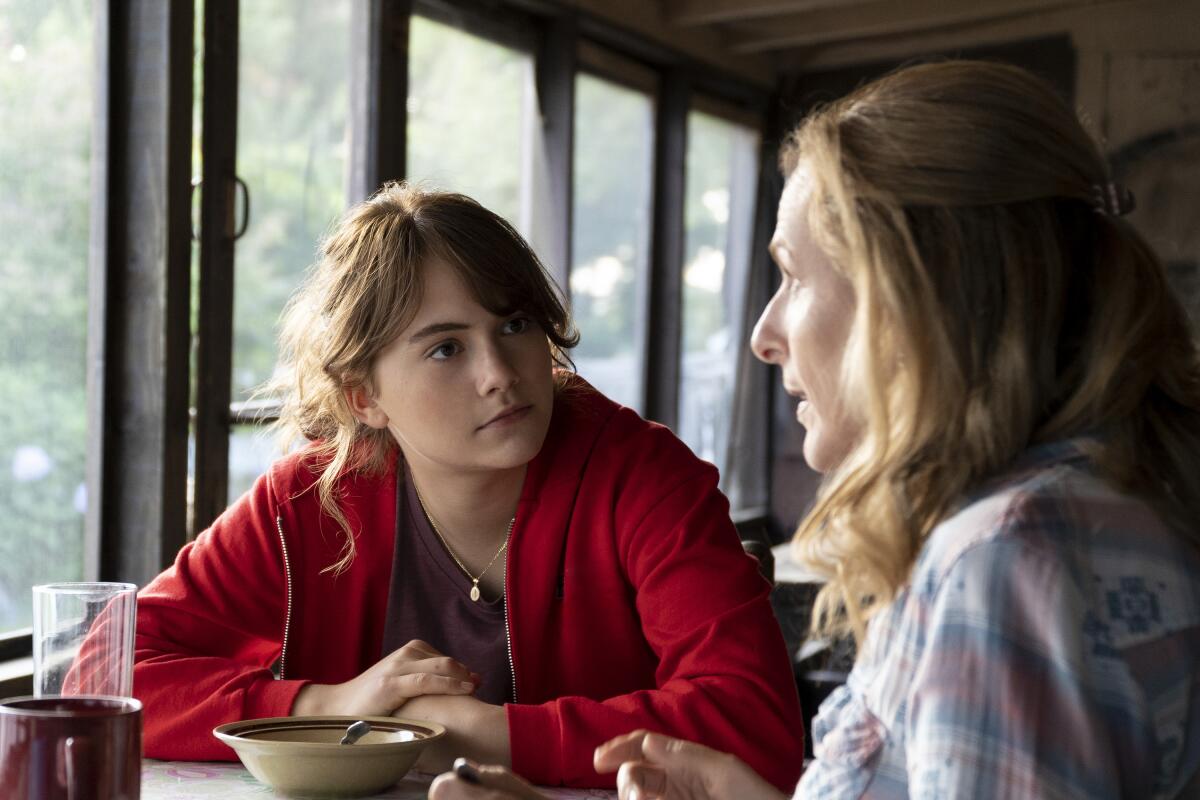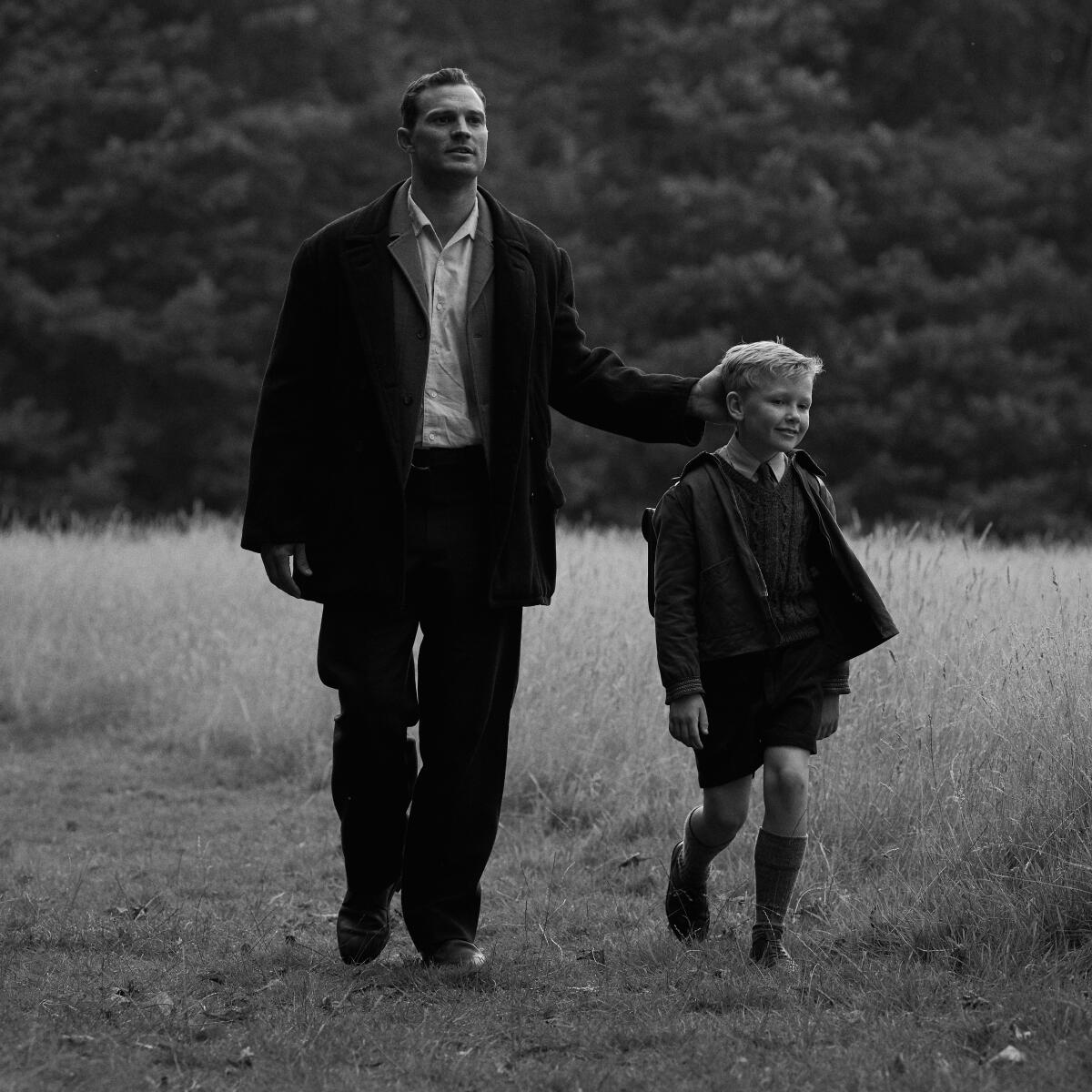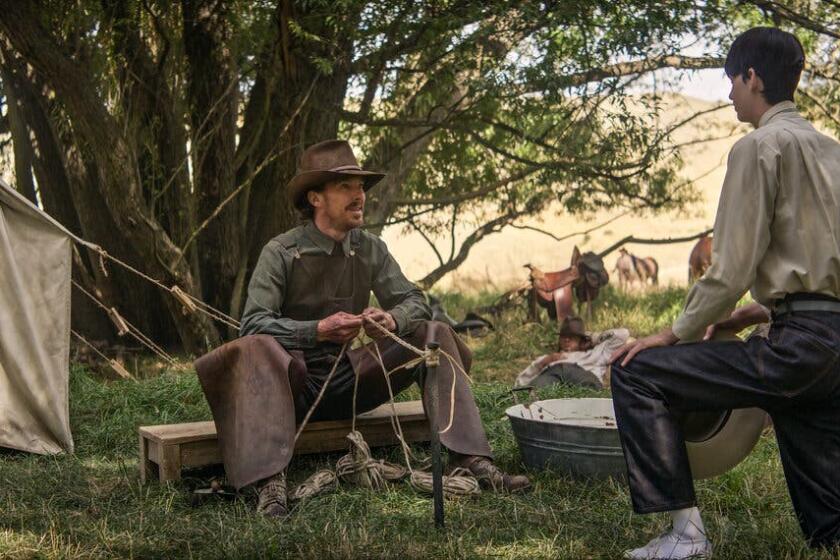Column: After two years of a pandemic, is it any wonder that family dominates the Oscar nods?

- Share via
With apologies to Tracee Ellis Ross and Leslie Jordan, Tuesday morning’s Oscar nominations show was a ridiculous, self-defensive mess and, as it turns out, completely unnecessary.
Running 32 minutes, the announcement of the nominees for the 94th Academy Awards played as a painfully obvious attempt to convince everyone that Movies Still Matter. In addition to the predawn effervescence of the bantering Ross and Jordan, the “show” dragged in all the usual suspects from the nonroaring ’20s — healthcare workers, firefighters, a film guy from TikTok — in an effort to prove the motion picture academy’s relevance.
They needn’t have bothered: The nominations spoke for themselves.
Seven years after the #OscarsSoWhite protest forced the film industry to acknowledge its alarming preference for tales of white men against the world, the definition of cinematic excellence has expanded in all sorts of long-overdue ways, leading to “Moonlight’s” 2017 triumph, “Parasite’s” non-English language 2020 sweep and last year’s “Nomadland” win.

Family themes dominate this year’s best picture list, which in itself is a break from the traditional emphasis on individualistic stories, and they are filtered through an array of prisms.
Any list that includes the sweet tear-jerker “CODA,” the visually breathtaking “Dune,” the black-and-white intimacy of “Belfast” and the epic tone poem “Drive My Car” is one that doesn’t need a stamp of approval from a TikTok “professional film enthusiast.” If young people choose to miss out on films such as these, or “The Power of the Dog,” “King Richard,” “Licorice Pizza” or almost any of the best picture nominees, it’s their loss, and no amount of “movies matter” messaging is going to help.
‘The Power of the Dog’ leads all movies with 12. What this year’s nominations mean for streaming, indie films and the overall future of the Oscars.
That said, it would have been nice to see “Spider-Man: No Way Home” on the list besides for visual effects; in addition to being one of the best films of 2021, it also fits in nicely with this year’s signature theme: family.
Much has been made of the effect COVID-19 has had on the theater business, but this year, I believe we are beginning to see its effect on the movies themselves. Not in a “Contagion” kind of way (although “Don’t Look Up” certainly has overtones of the regrettable politics involved in a similar disaster), but in a more deeply personal sense.

For more than two years, we have watched the pandemic sweep through families. Many of us have spent an inordinate amount of time hunkered down with some loved ones and separated, often for years, from others. Too many of us have lost parents, grandparents, siblings and children to COVID, and no family has been unaffected.
So it’s not surprising that the nominated films deal with a wide variety of familial relationships. In “Belfast,” “CODA” and “King Richard,” families struggle against forces external and internal; each deals with issues of social division and features parents clashing over what being a family means under such circumstances.
“The Power of the Dog” opens with, and chronicles, the question of what a son will do to protect a mother trapped in a toxic sibling dynamic. “Dune” gives us the thrilling and very rare sight of a mother and son willing to do what it takes to protect each other in the face of family annihilation. “West Side Story” once again examines the price exacted by family ties and misguided loyalty — as does, in a very different way, “Drive My Car,” in which a father-daughter-like friendship helps unearth the still festering ruins of two family tragedies.
Netflix had 27 nominations, the most of any studio. Disney-owned companies and Warner Bros. fared well. Apple got its first best picture nomination.
Ties of blood may play a less central role in “Licorice Pizza” and “Don’t Look Up,” but both feature family dinner scenes for the ages. Only “Nightmare Alley” focuses on the individual, although you could argue that the main character’s rejection of his found family, the circus, propels him to his fate — which, not to spoil anything, is not a happy, joyous one because, well, noir.
Family themes do not guarantee happy endings, either; this year’s nominations, including non-best picture nods for “The Lost Daughter” and “Parallel Mothers” (which focus on bonds so obvious they are in the title), honor films wildly different in tone and intent, ranging from iconically tragic to cathartically triumphant and hitting pretty much every note in between.
Are any of them the best? It almost always comes down to taste, politics and marketing, but if they had an Oscar for nomination list (and given Tuesday’s show, that could be the next promotional step), this year’s would definitely be a top contender.
And it might remind us all to take a moment and tell our families we love them.
More to Read
The biggest entertainment stories
Get our big stories about Hollywood, film, television, music, arts, culture and more right in your inbox as soon as they publish.
You may occasionally receive promotional content from the Los Angeles Times.













